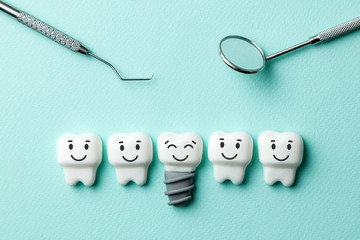
Tooth loss is a common issue throughout the country. Fortunately, losing a tooth no longer necessarily means that you need to go the rest of your life without it. Dental implants are a preferred tooth replacement option because they have so many benefits, but you want to be well informed before committing to them. Continue reading to learn some dental implant terms that you should know.
Abutment
This is the connecter that’s attached to the top of the dental implant. It serves as the attachment for the replacement tooth. It also helps to guarantee that the new replacement tooth stays firmly in its place. The abutment tooth is a crowned tooth that supports and stabilized a bridge or partial denture.
Ceramic
This is one of the materials that is often used to create the replacement teeth that are placed on the end of dental implants. It’s made from a type of clay and then hardened by heat. It is ideal because of its natural-looking tooth-like appearance.
Crown
A crown, also known as a cap, is used to replace a single tooth that has become damaged, broken, or missing. They typically fit over an existing tooth. In the case of dental implants, they are attached to the abutment to become perfectly grounded.
Dentures
This traditional tooth replacement option is very popular. However, you may not know that there are several different types of dentures available, like implant dentures. Instead of being held in by the natural suction of your mouth, they are supported by dental implants. This allows for additional longevity and stability compared to traditional dentures.
Endosteal Implant
This is the most common type of dental implant that’s used. In this case, the dentist will place the implant into the jawbone via a surgical procedure. Every implant holds at least one replacement tooth.
Eposteal Implant
Instead of being placed into the jawbone, eposteal implants are supported by resting on the jawbone. This isn’t a very common option anymore, but this type of implant still may be suggested if a patient is as high risk of advanced bone resorption.
Osseointegration
This is the process in which the dental implant fuses with the jawbone. This process improves the strength of both the jawbone and the dental implant.
By knowing more about dental implants, you will be better able to determine whether or not they are the best tooth replacement option for you. You’ll be showing off a restored smile in no time!
About the Author
Dr. Cale Beasley earned his dental doctorate from the University of Missouri at Kansas City and is committed to continuing education to keep his knowledge and skills sharp. He is a proud member of the American Dental Association, Colorado Dental Association, and SPEAR Education. For more information on dental implants or to schedule an appointment at his office in Littleton, visit his website or call (303) 794-1707.
